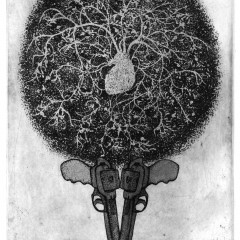Post by Colette Copeland
 Last night I attended David Lynch’s lecture, “Consciousness, Creativity and the Brain” at the University of Pennsylvania. The talk featured world renowned scientists John Hagelin–quantum physicist from “What the Bleep” and Andrew Newberg–Director of Nuclear Medicine at Penn (image, Lynch).
Last night I attended David Lynch’s lecture, “Consciousness, Creativity and the Brain” at the University of Pennsylvania. The talk featured world renowned scientists John Hagelin–quantum physicist from “What the Bleep” and Andrew Newberg–Director of Nuclear Medicine at Penn (image, Lynch).
After some lengthy introductions, Lynch opened the lecture with a 15 minute Q&A. When someone asked about his artistic practice or a film-related question, he immediately deflected the answer to speak about Transcendental Meditation–TM for short. From there, the other speakers dominated the evening’s events, evangelically presenting a lecture on the scientific benefits of TM and promoting Lynch’s new foundation for “Consciousness-based Education and World Peace.”
As some of you might know, David Lynch is my favorite filmmaker. What most of you probably don’t know, is that I am a certified yoga teacher and have been practicing yoga for 15 years. So I am a believer in the benefits of meditation and regularly teach my students how to heighten self awareness and go within to a place of stillness, which Lynch categorizes as bliss.
I think his utopic vision for world peace is wonderful (although I admit to some skepticism…) and think students and children would benefit tremendously from education in meditation techniques.
So with that prelude, I admit to feeling duped. I felt like I was sitting in an infomercial for TM. I thought Lynch would speak more about his creative process and the symbiotic relationship between creativity and consciousness. Instead the few questions the foundation ‘allowed’ him to answer sounded as if they had fed him his lines to deliver, in an effort to brainwash the audience.
Lynch’s answer on how he reconciles the violence in his films to his personal practice of TM was not satisfying. Yes, ART reflects the world and many artists use their vision to create contradictions and tensions. But Lynch’s unique ‘dark’ vision seems very much at odds with the blissful state of consciousness. The anger, which he describes as dissipating during his TM practic, is very present in his films. What also disturbed me was his comment about TM immediately transforming his life and his ability to achieve instant bliss on his first meditative try. Students may have unrealistic expectations about meditation and not realize that it is a process/journey and a skill, which requires practice and hard work.
–Video artist Colette Copeland teaches at Penn and the University of the Arts
copeland, colette
lynch, david









